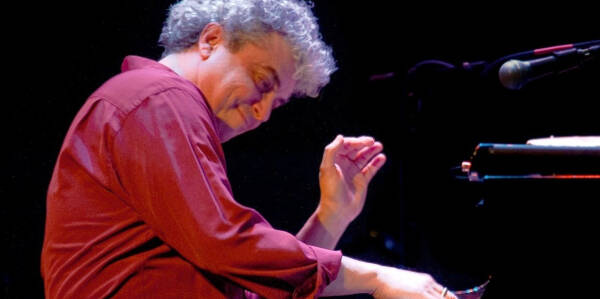Joyous and brilliant Brazilian jazz is coming this Saturday to Vashon Center for the Arts, with Jovino Santos Neto.
Santos Neto is acclaimed internationally for his prodigious piano chops that are fueled by a genuine, inexhaustible and infectious love of life and music.
Charismatic, he is adored by other musicians for his energetic improvisations while exploring Brazilian classics, as well as his dazzling, original compositions. A three-time Latin Grammy nominee, he is a master pianist, flutist, composer, arranger, conductor and educator originally from Rio de Janeiro.
Santos Neto moved to Seattle in 1993, after serving as a member of the legendary Hermeto Pascoal group. In addition to his award-winning work with his own various groups, he is widely recognized for his collaborations with such jazz luminaries as Airto Moreira, Flora Purim, Bill Frisell, Paquito d’Rivera, Airto Moreira, Claudio Roditi, David Sanchez, Joe Locke, Anat Cohen and many more.
His appearance on Vashon is a double-header as well — on Sunday afternoon, he’ll return to the Kay White stage to give a Talk On The Rock, “The Harmonic Forest – Musical Structures Heard As Trees,” illuminating his work as both a musician and biologist.
I caught up with my friend Jovino to ask some questions about the coming weekend’s offerings.
Jovino, so many people know you for your exquisite piano work, but you are also accomplished on a number of instruments. What other instruments do you like to play?
Hermeto Pascoal inspired me to start playing the flute and the melodica, and the rhythmic nature of the music of Brazil required me to understand its essence by playing other percussion instruments than the piano.
You recently performed in New York — how did that project go?
I played two sold-out sets at the Zinc Bar with my trio, and also worked with the Juilliard Jazz Orchestra, preparing and conducting the music of Hermeto. We had a beautiful concert with the composer sitting in the audience. [It was] a great responsibility and a lot of work, but the reward of hearing his music played by young artists was enormous.”
Tell us about your trio.
Music is the great connector for different generations. For this concert on Vashon, I will be joined by Mark Ivester on drums.
We have been playing together since I arrived in Seattle in 1993. On bass, we will have the brilliant Alex Dyring. He comes from a family of musicians and brings the Latin musical perspective from Colombia, where one of his parents is from. He is versatile and open-minded. I expect great musical conversations onstage.
What kind of material will you perform on Saturday?
Mostly my own compositions, but we also have some Pixinguinha, some Hermeto and some Johnny Alf. I picked tunes that lend themselves to different interpretations, so we can explore them creatively.”
What upcoming projects are you excited about?
With the untimely passing of our dear musical brother Chuck Deardorf, a huge gap was left in our musical world. The challenge for me now is to find new ways to keep the music moving forward, so I am exploring different instrumentations and formats.
In April, I am going on a tour of Estonia in a duo with Martin Kuuskmann, a virtuoso classical bassoonist. I try to keep active in a global context, which is challenging in this COVID world. I continue to write lots of music, including chamber and orchestral music.
I will be featured with the Port Townsend Symphony, playing one of my pieces in February, and will do a tour of California with bassist Nilson Matta (from the Trio da Paz) and will be in Europe in July with a trio.
Tell us about your talk at VCA on Sunday.
I am actually a biologist who never had a job as one. Right after I graduated from McGill University, in 1977, I started working with Hermeto. What I thought were two divergent paths became one wide road where I travel.
So learning about Hermeto’s intuitive harmonic concepts led me to perceive them as ecological ideas, in which the biological basis on life and consciousness also shapes our musical concepts. In this talk, I will explore some of these concepts in simple language, free of jargon.
What led you to want to pursue this presentation?
“It was a way to integrate who I am, a breaking down of internal walls. I am a musician, and also someone who tries to perceive our universe. Finding the common points between music and biology is very satisfying, and I love to tell stories, so this is what happens in these talks.”
If you were marooned on an island, what three records would you choose to have to listen to?
“I would leave the records behind, and take an instrument instead. All the music I have ever heard is already stored in my internal drive. It’s fascinating to listen to music from the past and to feel that somehow there is a memory of it or of something like it. Hermeto’s concept of music as a universal force makes a lot of sense. I love to listen to music at random, and of course, I like to create fresh music. It all becomes part of a huge universal stream of sounds.”
Bruce Phares, an islander, is a noted jazz bassist and a central figure in Vashon’s jazz scene.


